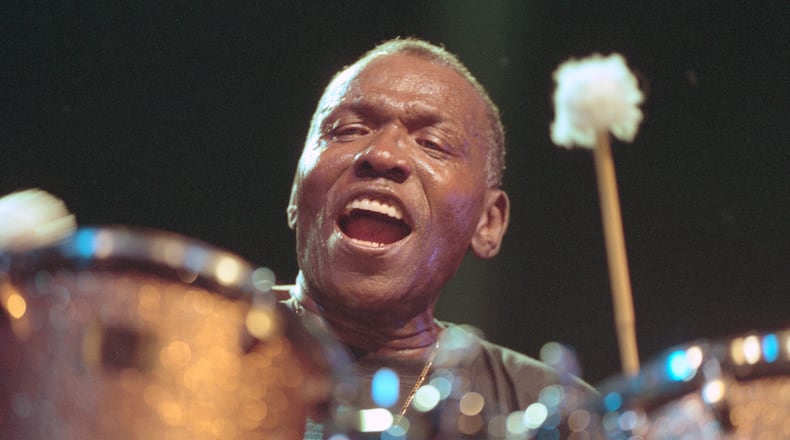The documentary purports that you can’t tell the history of jazz without telling the history of jazz from Detroit. And you can’t tell the history of jazz from Detroit without honing in on the mentors, school systems, the struggles and triumphs of the black communities and the history and cultural tapestries of the Midwestern metropolis.
The film features interviews with jazz figureheads like Barry Harris, Marcus Belgrave, Ron Carter and Yusef Lateef, alongside modern standouts Regina Carter, Karriem Riggins and Rodney Whitaker. Also featured are subjects on the genre’s periphery but with a strong connection to Detroit, like Don Was and the MC5′s Wayne Kramer.
At one point in Detroit’s history, cars and jazz musicians were coming off the assembly line, with the city being underscored by the sounds of factories and churches. The film beautifully reflects and balances the city’s fascinating, complex history — through the Great Migration, the building of the black middle class, the 1967 riots and the collapse of the auto industry — while substantiating its deep connection with jazz music.
“I don’t think there’s any question that in the middle of the 20th century, no city was having as big an impact on jazz as Detroit,” Stryker said. “What happened in Detroit, musically, was not an accident. It was a result of very specific cultural, economic and social conditions and specific people, not all of whom are household names.”
Detroit has played a major role in American popular music, as evidenced by Motown, rock, punk, rap, house and other genres. But because jazz is often marginalized in American culture, we can often fail to notice Detroit’s critical role in the annals of jazz history. The film suggests that Detroit — despite the scenes in New Orleans, Chicago and Kansas City — played one of the biggest roles in developing jazz music before it hit the East Coast.
“The story of these individual cities tends to fall away,” Stryker said. “Our film sort of reframes that discussion. We want people to understand and to remember that all of those musicians that came to New York came from somewhere; they came out of very particular jazz microclimates.”
Director Daniel Loewenthal has been a jazz fan all his life. While working on a project in 2013 in Detroit, he and his wife Roberta Friedman, a producer, became enamored with Detroit’s incredible history and roller coaster fortunes. Detroit’s past also paralleled and reminded Loewenthal of his home city of Newark, NJ — which also lost significant population after urban upheaval and never quite recovered.
Combining those interests with Stryker’s book, “The Best of the Best” saw a collaboration between Loewenthal, Friedman and Stryker that concurrently wove together a revelatory story of history and jazz from Detroit.
Credit: Brandon Berry
Credit: Brandon Berry
“Everything we talked about sort of had to relate to the music,” Loewenthal said. “Even the fact that the riots undermined the middle class, undermined the wealth in the city, lost the population base, the story becomes how the music continued. And then through it all was this tradition of mentorship.”
The film takes pause to focus on several mentors throughout the development of jazz from Detroit, including late pianist Barry Harris and late trumpeter Marcus Belgrave. Footage of Harris depicts him as having a more dictatorial, harsh style of teaching, while Belgrave is gentle yet demanding. The story vignettes allude to the importance of tradition, of passing the torch to next generation jazz musicians and the emphasis put on music education.
In Detroit, there are schools that train people to play at a high level, mentors to continue that education and enough venues to play at night to allow those musicians to earn a stable living. As the documentary points out, it’s a powerful combination of elements that doesn’t happen in every city; it happens uniquely in Detroit.
“We often forget about the role that the arts and the humanities play,” Stryker said. “Look at what Detroit produced by investing in public school music. It’s important enough that we made a film about it.”
Over 800 people attended the premiere of “The Best of the Best” at Detroit’s Freep Film Festival. It received a standing ovation.
The film has also been accepted into several festivals, including Richmond International Film Festival, Newport Beach Film Festival, Buffalo Film Festival and others as far as Braunschweig, Germany and Bucharest, Romania.
“We think of [Detroit] as this industrial giant, but it was a cultural giant, too,” Loewenthal said. “In many ways, the music that came out of Detroit was the soundtrack of America.”
Contact this contributing writer at branberry100@gmail.com.
How to go
What: Screening of “The Best of the Best: Jazz from Detroit,” with a post-screening talk with producer Mark Stryker
When: 7:30 p.m. Oct. 9
Where: The Neon, 130 E. 5th St., Dayton
Cost: $12.50
Tickets: www.neonmovies.com/movie/the-best-of-the-best-jazz-from-detroit
About the Author





